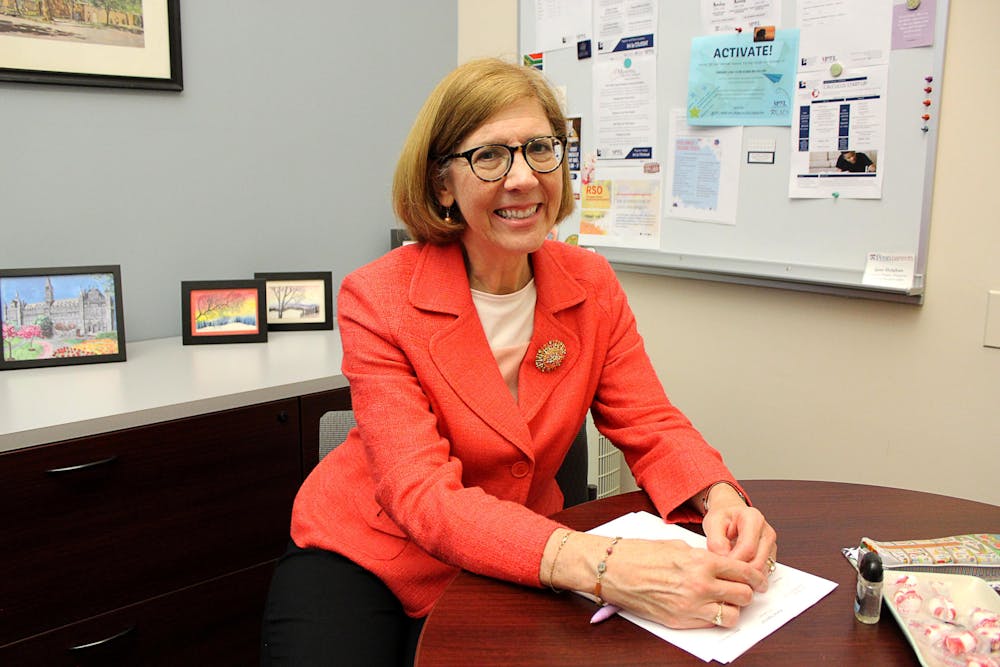
As Penn’s home for academic support and disability services, the Weingarten Center works with students in all 12 schools. Students seek assistance in strengthening their study strategies to undertake their academic work with confidence. They also look to Weingarten as a safe space to disclose their disabilities and discuss accommodations that level the playing field. Our work with students has a common theme: Weingarten’s mission is to destigmatize what it means to ask for academic assistance and accommodations based on a disability. As the executive director, I am keenly aware of my staff’s ongoing efforts to provide reassurance to those who utilize our services, letting them know they are not alone.
Over the past few months, a dialogue has been taking place in the opinion section of The Daily Pennsylvanian. People with disabilities may be offended by the perspectives of individuals who assert that accommodations are not always justifiable; however, let’s look at the article published in December 2023 titled “Time accommodations need to go” as a starting point for a dialogue, not a monologue. We are a community, and we must work together to gain insight and understanding into other viewpoints. While I do not agree with the writer’s perspective, I can look at the article as another daily reminder that I am an advocate for people with disabilities. Instead of shutting off the other side, an opportunity has arisen to learn, to listen to multiple perspectives, and to refute data that does not support an argument. Keeping an open mind can be challenging, yet necessary, in looking at another side of an issue.
Positive changes have emerged because of the Americans with Disabilities Act of 1990 and the amendment to the ADA in 2008. Nonetheless, the broader public struggles to view disability through a holistic lens. If a person has a physical disability and uses a wheelchair, it is generally accepted that accommodations are required for accessibility and inclusion. However, accommodation considerations for students with learning disabilities, such as extended time for exams, are often questioned and resisted. This is a narrow way of viewing accommodations. Invisible disabilities do not mean they are unobtrusive to a person’s daily experience. These unseen disabilities can include cognitive impairments or chronic physical and mental health conditions — with many individuals navigating more than one disability at a time.
Here is what must be kept in mind: the ADA clearly identifies major life activities as caring for oneself, performing manual tasks, seeing, hearing, eating, sleeping, walking, standing, lifting, bending, speaking, breathing, learning, reading, concentrating, thinking, communicating, and working. To mitigate the effect of a disability upon a major life activity, it requires accommodations that provide students with equal access to programs and facilities. Hence, a student with a reading disability might require extended time for exams and assistive technology. In short, the law requires determining accommodations based on medical documentation, a student’s history of accommodations, and the interactive process that takes place between the disability advisor and student. I assure the Penn community that the disability services staff at Weingarten are experienced professionals who work with compassionate responsibility to ensure accessibility and belonging for students with disabilities.
Another aspect of disability fits within the framework of diversity. In her article “Conceptualizing disability: three models of disability,” Rhoda Olkin defines the social model of disability as follows:
Disability is seen as one aspect of a person’s identity, much like race/ethnicity, gender, etc. From this perspective, disability is believed to result from a mismatch between the disabled person and the environment (both physical and social). It is this environment that creates the handicaps and barriers, not the disability. From this perspective, the way to address disability is to change the environment and society, rather than people with disabilities. Negative stereotypes, discrimination and oppression serve as barriers to environmental change and full inclusion.
Weingarten services are available for all Penn students. Some students do not have disabilities but actively rely upon consultations with learning specialists and tutoring services. There are students who use both academic support and disability services. The aim is for all students to feel respected and included in the community; they belong here at Penn.
To help foster belonging and learning, Weingarten staff hosts an annual disability symposium, which provides an opportunity for Penn staff, faculty, and students as well as educators from other colleges and universities to better understand disability issues. This past symposium’s theme was Shared Responsibility and Collaborative Partnerships. Mark Wolff, dean of Penn’s School of Dental Medicine, was the plenary speaker who launched the day of active learning and thoughtful conversations. He stated, “We need to think differently about working with people with disabilities.” Dr. Wolff spoke about innovative ways to address the needs of people with disabilities while upholding their dignity, whether through the design of a dental office or curriculum development for dental students. As I continue to learn about different aspects of disability issues, I encourage students to further their learning by having conversations around accommodations and to learn from one another. I believe the student perspective is critical in creating meaningful awareness around this issue.
Here is my message to the Penn community: Remember that disability is part of the diversity framework. Don’t dismiss disability; this is a critical aspect of many people’s identities and their daily experience of navigating the world. Put aside your misperceptions and biases. Seize the moment to learn about disability culture and the individuals who make Penn a diverse and dynamic community.
JANE HOLAHAN is the executive director of the Weingarten Center and oversees all aspects of disability and academic support at Penn. Her email is jholahan@upenn.edu.
The Daily Pennsylvanian is an independent, student-run newspaper. Please consider making a donation to support the coverage that shapes the University. Your generosity ensures a future of strong journalism at Penn.
Donate






